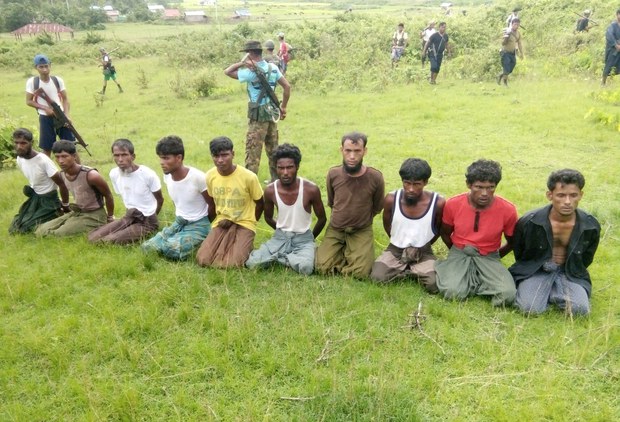ICC Launches Probe into Alleged Crimes by Myanmar against Rohingya
2019.11.14
Washington
 Ten Rohingya men whose hands are bound kneel as Myanmar security forces stand guard in Inn Din, a village in Myanmar’s Rakhine state, Sept. 2, 2017.
Ten Rohingya men whose hands are bound kneel as Myanmar security forces stand guard in Inn Din, a village in Myanmar’s Rakhine state, Sept. 2, 2017.
The International Criminal Court on Thursday authorized an official investigation into alleged crimes against humanity by Myanmar’s military that forced hundreds of thousands of Rohingya to shelter in Bangladesh – the third time Naypyidaw has faced international legal action this week over the stateless minority.
The Netherlands-based court announced that a pre-trial chamber had cleared the ICC prosecutor “to proceed with an investigation for the alleged crimes within the ICC’s jurisdiction” into the situation in Bangladesh and Myanmar.
“[T]here exists a reasonable basis to believe widespread and/or systematic acts of violence may have been committed that could qualify as the crimes against humanity of deportation across the Myanmar-Bangladesh border and persecution on grounds of ethnicity and/or religion against the Rohingya population,” the court said in a news release issued from The Hague.
In Dhaka, a senior government official said Bangladesh would cooperate with ICC investigators.
Because Bangladesh is a signatory to the Rome Statute, the treaty that established the ICC, “we will have to provide all information sought by the ICC prosecution, and we will do it,” State Minister for Foreign Affairs Shahriar Alam told BenarNews after the court made its announcement.
“They have taken the issue to cognizance on primary information they gathered after talking to the persecuted people,” he said, referring to an ICC team that traveled to Rohingya camps in Cox’s Bazar during a visit to Bangladesh in July.
“We will cooperate with ICC by giving them information – whatever they want – as a country which has given shelter to this persecuted population,” the junior minister added.
The pre-trial chamber in The Hague concluded in its review of preliminary information that it was reasonable “to believe that since at least 9 October 2016, members of the Tatmadaw [the Myanmar military], jointly with other security forces and with some participation of local civilians, may have committed coercive acts” against the Rohingya people that constitute crimes against humanity, the chamber said in a 55-page court document.
When the ICC team visited Bangladesh four months ago, the court’s deputy prosecutor explained that because Myanmar was not a signatory to the Rome Statute, the court potentially could be limited to focusing a probe on alleged crimes that occurred in part on Bangladeshi soil, which is within the court’s jurisdiction.
Myanmar’s expulsion of Rohingya across its border with Bangladesh could qualify as a crime against humanity because it touched on Bangladeshi territory, Deputy ICC Prosecutor James Stewart told reporters in Dhaka at the time.
More than 740,000 Rohingya fled to southeastern Bangladesh after Myanmar’s military launched a brutal offensive in Rakhine state in the wake of deadly attacks by a Rohingya rebel group on government security posts in late August 2017.
On Monday, the African nation of Gambia filed a lawsuit against Myanmar with the ICC’s sister body, the International Court of Justice, accusing Naypyidaw of state-sponsored genocide against the Rohingya.
Two days later, a court in Argentina named Myanmar leader Aung San Suu Kyi and other top officials from the Southeast Asian nation, including army chief Min Aung Hlaing, as targets of a lawsuit filed by Rohingya and South American rights groups.
They are seeking justice for the Rohingya, under the concept of “universal jurisdiction,” for crimes committed against the stateless Muslim minority, reports said.
Jesmin Papri in Dhaka contributed to this report.







